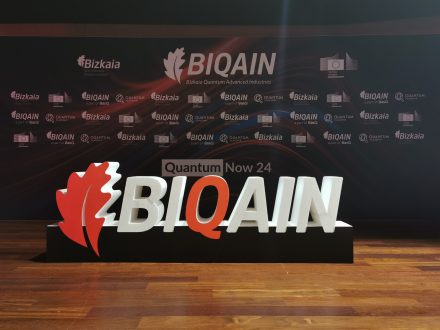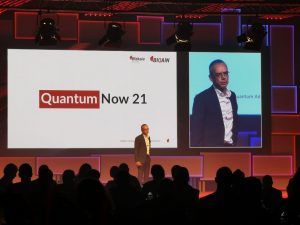BIQAIN is Born to Boost the Quantum Technology Industry

Bizkaia Quantum Advanced Industries consolidates a strategy that began in 2021 to build an ecosystem of organisations that collaborate and accelerate the development and commercialisation of quantum technologies.
The development of quantum technologies is currently at a turning point where we are already seeing important advances that will revolutionise industries and change the world.
Experts agree that we are in the prehistory of the quantum world in its various forms, as the vast majority of projects are still in the laboratory and emulation phase: (native) quantum systems still have a long way to go before they can be considered sufficiently reliable and robust, which is defined in scientific terms as ‘quantum supremacy’.
But it is something that could happen in two or three years if we take into account the development and momentum that is currently occurring, both at the hardware level and in terms of applications that can extract the potential of quantum.
It is true that quantum technology breaks the rules of traditional physics, but it has a common denominator with other technological disruptions that have come to the world in the last 40 or 50 years: collaboration between the different actors (public and private organisations) is essential so that everyone is rowing in the same direction and can share knowledge and innovations.
BIQAIN makes Bizkaia a world hub for quantum technologies
This is precisely the main objective of BIQAIN (Bizkaia Quantum Advanced Industries), a strategy that aims to consolidate what was born in 2021 to build an ecosystem made up of technology and research centres, universities and companies under the baton of the Provincial Council of Bizkaia and its technological arm, the historic Lantik (the technology and innovation company of Bizkaia).
![]()
BIQAIN was presented yesterday at the BEC! in Barakaldo on the occasion of the Quantum Now 24 congress, where Silicon was present. During the event, Valentín García, Director of Innovation at Lantik, explained the objectives and commitments that were set in 2021 and which have consolidated this initiative to make Bizkaia a world leader in quantum technologies.
One of the most important of these is to facilitate access to the most advanced technologies in the world: ‘Bizkaia is probably the place in the world with access to the most quantum technologies. This is because we still don’t know which of them is going to lead the market’, according to García.
Specifically, BIQAIN will provide access to 12 quantum platforms, including Fujitsu and IBM systems, as well as technologies developed by providers such as AWS, Microsoft and Telefónica.
The executive also explained the importance of promoting the ethical use of quantum technologies through training, something of vital importance in any disruptive advance that affects society.
From the outset, BIQAIN also envisages setting up various laboratories (such as the ones it already has for quantum sensing and optical communications and security) to seek the applicability of the projects developed by the ecosystem.

The launch of BIQAIN takes place in a context in which the European Union has decided to make a strong commitment so that the region does not fall behind in the development of quantum technologies and leads this transition worldwide.
This was also emphasised by Enrique Sánchez, director of the European Quantum Flagship strategy, an initiative with an investment of 1 billion euros: ‘Our goal is to make the European Union one of the key players in this development. The BIQAIN initiative is working in unprecedented coordination and is an example for most of the world. In the meantime, the EU must invest in basic research and support advanced research to achieve this goal.
The creation of this initiative coincides in time with the signing of the European Quantum Technologies Declaration (from which the €1 billion investment follows), as well as with the UN’s proclamation of 2025 as the International Year of Quantum Science and Technology.
BIQAIN’s headquarters will be located in the María Goyri building of the technology park located on the UPV/EHU’s Leioa campus. These facilities will bring together all of Bizkaia’s knowledge in quantum technology, including the 15 quantum start-ups that already exist in the county council, but with the aim of incorporating any SME in Spain that wishes to do so and wants to work on quantum projects.
Ecosystem and collaboration, the key to success
This common denominator in everything related to research and innovation is no exception in the case of quantum technologies. On the one hand we have the large ICT providers who are developing quantum systems, who need projects and applications designed for these systems. On the other hand, we have small organisations, including many start-ups, which need the hardware and resources to be able to run their software developments.
Therefore, collaboration between these entities, large and small, is of vital importance to continue to innovate and make quantum technologies a reality.
During the Quantum Now 24 event, we were able to verify this fact through the heads of the main companies working on quantum technologies: IBM, Fujitsu, AWS, Microsoft, Telefónica and the GAIA organisation, all of them gathered at a round table that allowed us to find out where each of them is at and the most relevant use cases they are working on.

IBM and Fujitsu have been building quantum computing systems for years and are offering them to startups so that they can use these resources. Their goal is to make projects a reality, but at the same time provide security at all stages.
Similarly, Microsoft and AWS are also developing quantum simulation platforms in the cloud, but they depend on the success of the customers who are using them to bring all these services to society.
For its part, GAIA LKS Next has the challenge of distilling and democratising the use of these technologies so that they end up becoming part of the Quantum Economy, as they call it.
Pay-per-use of these quantum systems (both ‘native’ and those that emulate quantum conditions), as well as applications, will also be a common denominator for the industry. This has greatly stimulated the adoption of the public cloud, as you only pay for the computing, storage and networking resources you need at any given time. This as-a-service philosophy will most likely be replicated in quantum business models, at least in the early stages of production. We will see some cases where customers with more financial muscle such as banks can afford to buy complete quantum systems such as those being developed by IBM and Fujitsu, but it will not be the norm in a world already dominated by pay-as-you-go technology.
Developments and use cases that already stand out
Quantum technologies have the potential to be applied to a multitude of areas, but for now, it makes the most sense to develop them in environments that require high doses of computation, huge amounts of information and much faster data transmissions than today.
Therefore, it makes sense that sectors such as Finance, Energy, Telecommunications, Medicine, Advanced Manufacturing or Biochemistry are the first sectors to benefit from quantum. In fact, the use cases already in the pipeline have a lot to do with these sectors, some of them named during the conference and shown below:
- Much more sophisticated financial products
- Scientific research in the field of health
- Personalisation of insurance company products
- Optimisation of fraud detection
- Optimisation of complex processes
- More efficient and faster predictive analytics
Quantum technologies will bring about a paradigm shift both in companies and in society itself. Although we are in the early stages of development and research and are waiting for the ‘quantum supremacy’ to take place, it is essential that all actors (large and small) collaborate and work together to achieve it, always from an ethical and positive point of view for human beings. And the strategy implemented by BIQAIN revolves around these premises.
What is quantum technology?
Quantum technology is based on quantum mechanics, a branch of physics that studies how matter and energy behave at very small scales, such as at the level of atoms and subatomic particles. At this scale, the rules governing the behaviour of objects do not follow the laws of classical physics and are, in many cases, counter-intuitive and unpredictable.
Fundamental properties of quantum technology:
1. Superposition: In the quantum world, particles can exist in several states at the same time. This means that, for example, an electron can be in more than one position or have more than one energy value simultaneously, similar to a coin that is ‘in the air’, not yet ‘heads’ or ‘tails’, until it is observed.
2. Quantum entanglement: A phenomenon by which two particles can be so intimately connected that what happens to one affects the other instantaneously, no matter how far apart they are. This interconnection defies common sense, as the particles appear to ‘share information’ instantaneously, a process that has no analogue in classical physics.
3. Quantum tunnel effect: Particles can ‘pass through’ barriers that, according to classical physics, should be impassable. In other words, a particle can pass through an obstacle that would seem impossible to overcome in the macroscopic world, like a car driving through a mountain instead of around it.
Families of quantum technologies:
1. quantum computing and simulation: unlike traditional computers that process information using bits (which can only be 0 or 1), quantum computers use qubits, which can be 0, 1 or both at the same time due to superposition. This allows parallel computations, tackling complex problems much faster than conventional computers. Quantum computers are capable of solving problems that would take years or even centuries for current systems to process.
2. Quantum communications and cybersecurity: Using quantum properties, highly secure communication systems can be developed. Any attempt at espionage in a quantum system would be detected immediately, as the moment someone tries to intercept the data, they alter the information in a detectable way. This opens the door to virtually inviolable methods of information transmission.
3. Quantum sensing and metrology: Quantum sensing enables the development of extremely precise sensors, using phenomena such as superposition and entanglement to measure physical properties more accurately than traditional devices. Quantum metrology is the discipline that harnesses these properties to measure quantities such as time, gravity or magnetic field with extreme precision, which has applications in a variety of technological and scientific areas.
Additional important concepts:
1. Quantum decoherence: one of the biggest challenges in quantum technology is to keep quantum states ‘pure’. Decoherence occurs when a quantum system interacts with its environment, losing its quantum behaviour and reverting to following classical rules.
2. Quantum error correction: Due to the fragility of quantum states (especially in quantum computing), methods are being developed to correct errors that arise during calculations, ensuring the reliability of the results.
In short, quantum technology harnesses complex and counter-intuitive phenomena in the quantum world to revolutionise information processing, communication and measurement. However, fully understanding these phenomena is only possible through mathematical language and specialised experiments, due to the non-intuitive nature of quantum behaviour.
At Silicon, we will keep a close eye on these developments to bring them to our readers.